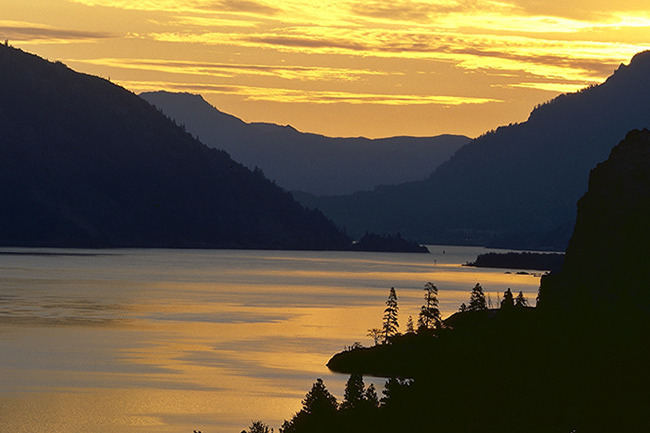Back to Newsroom
Here's What You Made Happen for the Gorge in 2016

Sunset viewed from Washington SR-14 in the Columbia Gorge. (photographer: James Holloway)
December 15, 2016
In 2016, the Gorge faced numerous challenges and opportunities. The following is an overview of the advocacy, conservation, and legal accomplishments of Friends of the Columbia Gorge and its allies in 2016 - work that could not happen without the support and engagement of our members and volunteers.
With numerous threats to the Gorge still on the table and a newly challenging political climate, the Gorge will need more friends than ever in 2017. If you are not a Friends member, we invite you to join today. If you are a member, please consider making an additional end-of-year gift. Thank you for your continued support for the Gorge!
January
- With a coalition of groups including Friends intervening in the permit process, the developer of the controversial Troutdale Energy Center, a gas power plant proposed at a site at the western boundary of the Columbia River Gorge National Scenic Area, abandons the project.
- The Draft Environmental Impact Statement (DEIS) public review period for Tesoro Savage's proposed oil terminal at the Port of Vancouver ends late in the month. Friends and allies work to help generate a record 289,000-plus comments submitted to the Washington Energy Facility Site Evaluation Council (EFSEC), with the overwhelming majority opposing the project. Approximately 2,000 people attend three public hearings (two in Clark County, WA, one in Spokane), also with a large majority in opposition. Further hearings are held later in 2016 (read Friends and allies' final adjudication brief). Sometime early in 2017, EFSEC will issue a final EIS along with a recommendation to the Washington Governor to either approve or deny the project.
March
May
- The Gorge Tourism Studio planning process concludes and “bringing Gorge Towns to Trails to life” becomes a top priority of soon-to-be created Gorge Tourism Alliance.
- The Power Past Coal coalition, of which Friends is a member, claims a huge victory. The Army Corps of Engineers, citing Lummi Nation treaty rights, denies a needed permit for a new coal export terminal at Cherry Point, WA, effectively ending a project that would have shipped an additional 48 million tons of coal through the Columbia Gorge each year.
- In response to Nestlé's plans to open a bottled-water facility in Cascade Locks, OR, using springwater from Herman Creek, Hood River County voters approve ban on new commercial bottled-water facilities. Friends was among the groups arguing the transfer of water rights that would enable the project was not in the public's interest.
- The first public hearing is held on the Draft Environmental Impact Study for the only remaining coal export proposal in Washington, the Millennium terminal in Longview. Most of the thousand-plus in attendance and giving testimony to Washington Department of Ecology regulators are opponents of the terminal, which would handle for shipment to Asia 44 million tons of coal annually, all of it arriving on open-top coal trains that pass through the Columbia Gorge. (The public comment period for the federal review of the proposal, by the Army Corps of Engineers, is conducted in the fall.)
June
September
October
November

